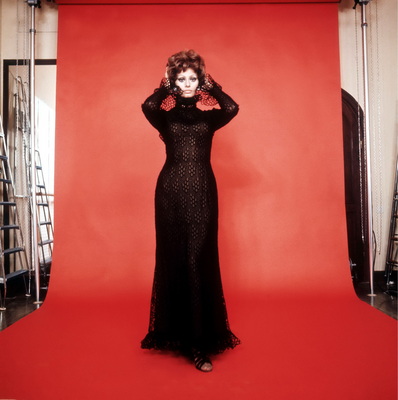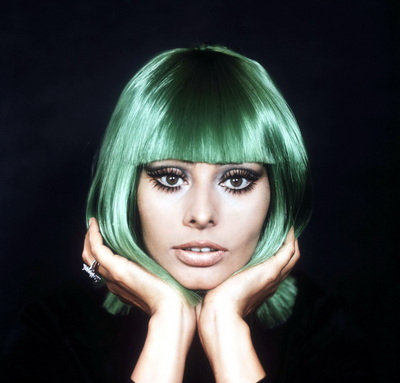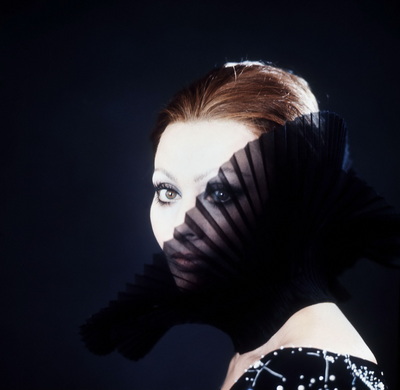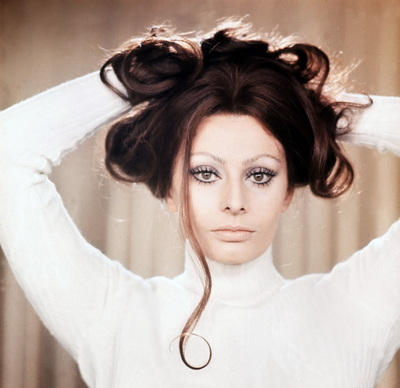Sophia Loren

Sophia Loren (/soʊˈfiːə ləˈrɛn/; Italian pronunciation: ; born Sofia Villani Scicolone , 20 September 1934) is an Italian film actress. Encouraged to enroll in acting lessons after entering a beauty pageant, Loren began her film career in 1950 at age 15. She appeared in several bit parts and minor roles in the early part of the decade, until her five-picture contract with Paramount in 1956 launched her international career. Notable film appearances around this time include The Pride and the Passion, Houseboat, and It Started in Naples.
Her talents as an actress were not recognized until her performance as Cesira in Vittorio De Sica's Two Women; Loren's performance earned her the Academy Award for Best Actress in 1962 and made her the first artist to win an Oscar for a foreign-language performance. She holds the record for having earned six David di Donatello Awards for Best Actress, the most ever received: Two Women; Yesterday, Today and Tomorrow; Marriage Italian Style (for which she was nominated for a second Oscar); Sunflower; The Voyage; and A Special Day. After starting her family in the early 1970s, Loren spent less time on her acting career and chose to make only occasional film appearances. In later years, she has appeared in American films such as Grumpier Old Men and Nine.
Aside from the Academy Award, she has won a Grammy Award, five special Golden Globes, a BAFTA Award, a Laurel Award, the Best Actress Award at the Cannes Film Festival, and the Honorary Academy Award in 1991. In 1995, she received the Cecil B. DeMille Award for lifetime achievements, one of many such awards. In 1999, Loren was acknowledged as one of the top 25 female American Screen Legends in the American Film Institute's survey, AFI's 100 Years...100 Stars.
Sophia Loren Posters
Early life
Loren was born Sofia Villani Scicolone in the Clinica Regina Margherita in Rome, Italy, the daughter of Romilda Villani (1910–1991) and Riccardo Scicolone, a construction engineer of noble descent (Loren wrote in her autobiography that she is entitled to call herself Marchesa di Licata Scicolone Murillo). Riccardo Scicolone refused to marry Villani, leaving Romilda, a piano teacher and aspiring actress, without support. Loren's parents had another child together, her sister Maria, in 1938. Loren has two younger paternal half-brothers, Giuliano and Giuseppe. Romilda, Sofia, and Maria lived with Loren's grandmother in Pozzuoli, near Naples.
During World War II, the harbour and munitions plant in Pozzuoli was a frequent bombing target of the Allies. During one raid, as Loren ran to the shelter, she was struck by shrapnel and wounded in the chin. After that, the family moved to Naples, where they were taken in by distant relatives. After the war, Loren and her family returned to Pozzuoli. Loren's grandmother Luisa opened a pub in their living room, selling homemade cherry liquor. Romilda Villani played the piano, Maria sang, and Loren waited on tables and washed dishes. The place was popular with the American GIs stationed nearby.
Career
When she was 14, Sofia entered a beauty pageant, Miss Italia 1950 and, while not winning, was selected as one of the finalists. Later, she enrolled in acting class and was selected as an uncredited extra in Mervyn LeRoy's film Quo Vadis (1951), at the age of 15. In 1951, she also appeared in Italian film Era lui... sì! sì! where she played an odalisque, being credited professionally as Sofia Lazzaro. She appeared in several bit parts and minor roles in the early part of the decade. She began using her current stage name in La Favorita (1952), the new name being a twist on the name of the Swedish actress Märta Torén and was suggested by Goffredo Lombardo or (according to the 2008 DVD) Carlo Ponti. Her first starring role was in Aida (1953), for which she received critical acclaim. After playing the lead role in Two Nights with Cleopatra (1953), her breakthrough role was in The Gold of Naples (1954), directed by Vittorio De Sica. Too Bad She's Bad, also released in 1954, became the first of many films in which Loren co-starred with Marcello Mastroianni. Over the next three years, she acted in many films, including Scandal in Sorrento, Lucky to Be a Woman, Boy on a Dolphin, Legend of the Lost and The Pride and the Passion.
Loren became an international film star following her five-picture contract with Paramount Pictures in 1958. Among her films at this time were Desire Under the Elms with Anthony Perkins, based upon the Eugene O'Neill play; Houseboat, a romantic comedy co-starring Cary Grant; and George Cukor's Heller in Pink Tights, in which she appeared as a blonde for the first time.
In 1961, she starred in Vittorio De Sica's Two Women, a stark, gritty story of a mother who is trying to protect her 12-year-old daughter in war-torn Italy. The two end up gang-raped inside a church as they travel back to their home city following cessation of bombings there. Originally cast as the daughter, Loren fought against type and was recast as the mother (actress Eleonora Brown would portray the daughter). Loren's performance earned her many awards, including the Cannes Film Festival's best performance prize, and an Academy Award for Best Actress, the first major Academy Award for a non-English-language performance and to an Italian actress. She won 22 international awards for Two Women. The film proved to be extremely well accepted by the critics and it was a huge commercial success.
During the 1960s, Loren was one of the most popular actresses in the world, and she continued to make films in the United States and Europe, starring with prominent leading men. In 1964, her career reached its pinnacle when she received $1 million to appear in The Fall of the Roman Empire. In 1965, she received a second Academy Award nomination for her performance in Marriage Italian-Style.
Among Loren's best-known films of this period are Samuel Bronston's epic production of El Cid (1961) with Charlton Heston, The Millionairess (1960) with Peter Sellers, It Started in Naples (1960) with Clark Gable, Vittorio De Sica's triptych Yesterday, Today, and Tomorrow (1963) with Marcello Mastroianni, Peter Ustinov's Lady L (1965) with Paul Newman, the 1966 classic Arabesque with Gregory Peck, and Charlie Chaplin's final film, A Countess from Hong Kong (1967) with Marlon Brando.
Loren received four Golden Globe Awards between 1964 and 1977 as "World Film Favorite – Female".
Loren worked less after becoming a mother. During the next decade, most of her roles were in Italian features. During the 1970s, she was paired with Richard Burton in the last De Sica-directed film, The Voyage (1974), and a remake of the film Brief Encounter (1974). The film had its premiere on US television on 12 November 1974 as part of the Hallmark Hall of Fame series on NBC. In 1976, she starred in The Cassandra Crossing. It fared extremely well internationally, and was a respectable box office success in US market. She co-starred with Marcello Mastroianni in Ettore Scola's A Special Day (1977). This movie was nominated for 11 international awards such as two Oscars (best actor in leading role, best foreign picture). It won a Golden Globe Award and a César Award for best foreign movie. Loren's performance was awarded with a David di Donatello Award, the seventh in her career. The movie was extremely well received by American reviewers and became a box office hit.
Following this success, Loren starred in an American thriller Brass Target. This movie received mixed reviews, although it was moderately successful in the United States and internationally. In 1978, she won her fourth Golden Globe for "world film favorite". Other movies of this decade were Academy award nominee Sunflower (1970), which was a critical success and Arthur Hiller's Man of La Mancha (1972), which was a critical and commercial failure despite being nominated for several awards including two Golden Globes Awards. O'Toole and James Coco were nominated for two NBR awards, in addition the NBR listed Man of La Mancha in its best ten pictures of 1972 list.
In 1980, after the international success of the biography Sophia Loren: Living and Loving, Her Own Story by A. Hotchner, Loren portrayed herself and her mother in a made-for-television biopic adaptation of her autobiography, Sophia Loren: Her Own Story. Ritza Brown and Chiara Ferrari each portrayed the younger Loren. In 1981, she became the first female celebrity to launch her own perfume, 'Sophia', and a brand of eyewear soon followed.
In 1982, while in Italy, she made headlines after serving an 18-day prison sentence on tax evasion charges—a fact that failed to hamper her popularity or career. In fact, Bill Moore, then employed at Pickle Packers International advertising department, sent her a pink pickle-shaped trophy for being "the prettiest lady in the prettiest pickle". In 2013, the supreme court of Italy cleared her of the charges.
She acted infrequently during the 1980s and turned down the role of Alexis Carrington in 1981 for the television series Dynasty. Although she was set to star in 13 episodes of CBS's Falcon Crest in 1984 as Angela Channing's half-sister Francesca Gioberti, negotiations fell through at the last moment and the role went to Gina Lollobrigida, instead. Sophia preferred devoting more time to raising her sons.
Loren has recorded more than two dozen songs throughout her career, including a best-selling album of comedic songs with Peter Sellers; reportedly, she had to fend off his romantic advances. Partly owing to Sellers's infatuation with Loren, he split with his first wife, Anne Howe. Loren has made it clear to numerous biographers that Sellers's affections were reciprocated only platonically. This collaboration was covered in The Life and Death of Peter Sellers where actress Sonia Aquino portrayed Loren. The song "Where Do You Go To (My Lovely)?" by Peter Sarstedt was said to have been inspired by Loren.
In 1991, Loren received the Academy Honorary Award for her contributions to world cinema and was declared "one of the world cinema's treasures". In 1995, she received the Golden Globe Cecil B. DeMille Award.
She presented Federico Fellini with his honorary Oscar in April 1993. In 2009, Loren stated on Larry King Live that Fellini had planned to direct her in a film shortly before his death in 1993. Throughout the 1990s and 2000s, Loren was selective about choosing her films and ventured into various areas of business, including cookbooks, eyewear, jewelry, and perfume. She received a Golden Globe nomination for her performance in Robert Altman's film Ready to Wear (1994), co-starring Julia Roberts.
In 1994, a Golden Palm Star on the Palm Springs, California, Walk of Stars was dedicated to her.
In Grumpier Old Men (1995), Loren played a femme fatale opposite Walter Matthau, Jack Lemmon, and Ann-Margret. The film was a box-office success and became Loren's biggest US hit in years. At the 20th Moscow International Film Festival in 1997, she was awarded an Honorable Prize for contribution to cinema. In 1999, the American Film Institute named Loren among the greatest female stars of Golden Age of Hollywood cinema. In 2001, Loren received a Special Grand Prix of the Americas Award at the Montreal World Film Festival for her body of work. She filmed two projects in Canada during this time: the independent film Between Strangers (2002), directed by her son Edoardo and co-starring Mira Sorvino, and the television miniseries Lives of the Saints (2004).
In 2009, after five years off the set and 14 years since she starred in a prominent US theatrical film, Loren starred in Rob Marshall's film version of Nine, based on the Broadway musical that tells the story of a director whose midlife crisis causes him to struggle to complete his latest film; he is forced to balance the influences of numerous formative women in his life, including his deceased mother. Loren was Marshall's first and only choice for the role. The film also stars Daniel Day-Lewis, Penélope Cruz, Kate Hudson, Marion Cotillard, and Nicole Kidman. As a part of the cast, she received her first nomination for a Screen Actors Guild Award.
In 2010, Loren played her own mother in a two-part Italian television miniseries about her early life, directed by Vittorio Sindoni, entitled La Mia Casa È Piena di Specchi (translated My House Is Full of Mirrors), based on the memoir written by her sister Maria. In July 2013, Loren was reportedly going to make her film comeback in an Italian adaptation of Jean Cocteau's 1930 play The Human Voice (La Voce Umana) which charts the breakdown of a woman who is left by her lover – with her youngest son, Edoardo Ponti, as director. Filming is to take under a month during July in various locations in Italy, including Rome and Naples. It will be Loren's first significant feature film since the 2009 film Nine, which received mixed critical reviews.
Lawsuits
In September 1999, Loren filed a lawsuit against 76 adult websites for posting altered nude photos of her on the internet.
Personal life
Loren is a Roman Catholic.
Her primary residence has been in Geneva, Switzerland, since late 2006. She also owns homes in Naples and Rome.
Loren is a huge fan of the football club S.S.C. Napoli. In May 2007, when the team was third in Serie B, she told the Gazzetta dello Sport that she would do a striptease if the team won.
Loren posed scantily clad, at age 72, for the 2007 Pirelli Calendar, along with Penélope Cruz and Hilary Swank.
Loren and Cary Grant co-starred in Houseboat (1958). Grant's wife Betsy Drake wrote the original script, and Grant originally intended that she would star with him. After he began an affair with Loren while filming The Pride and the Passion (1957), Grant arranged for Loren to take Drake's place with a rewritten script for which Drake did not receive credit. The affair ended in bitterness before The Pride and the Passion's filming ended, causing problems on the Houseboat set. Grant hoped to resume the relationship, but Loren agreed to marry Carlo Ponti, instead.
Loren first met Carlo Ponti, Sr. in 1950, when she was 16 and he was 37. They married on 17 September 1957. However, Ponti was still officially married to his first wife Giuliana under Italian law, because Italy did not recognize divorce at that time. The couple had their marriage annulled in 1962 to escape bigamy charges. In 1965, Ponti obtained a divorce from Giuliana in France, allowing him to marry Loren on 9 April 1966.
The couple became French citizens after their application was approved by then French President Georges Pompidou.
They had two children:
Loren's daughters-in-law are Sasha Alexander and Andrea Meszaros. Loren has four grandchildren.
Loren remained married to Carlo Ponti until his death on 10 January 2007 of pulmonary complications. When asked in a November 2009 interview if she were ever likely to marry again, Loren replied "No, never again. It would be impossible to love anyone else."
In 1962, Loren's sister, Anna Maria Villani Scicolone, married the youngest son of Benito Mussolini, Romano, with whom she had two daughters, Alessandra the conservative Italian politician and Elisabetta.
Filmography
According to box office polls, Loren was voted among the most popular stars with British audiences.



